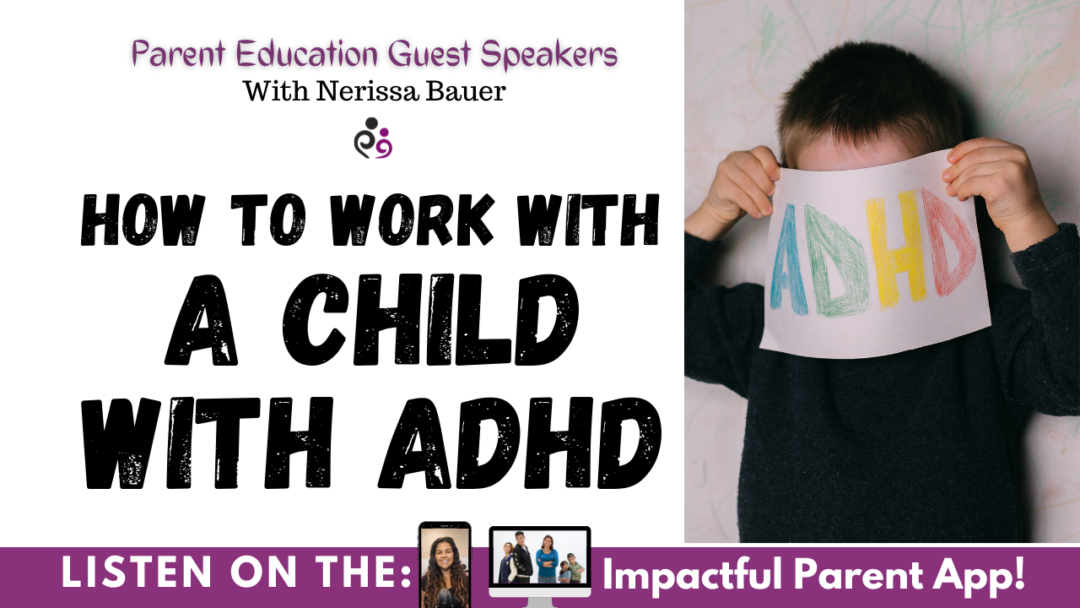ADHD
Nerissa Bauer gives tips to parents on how they can help their child with ADHD to be their best selves. Nerissa’s tips are practical and useful PLUS- Nerissa gives the audience a FREE E-BOOK! Her free e-book, “Getting the care your child needs with an ADHD Care Plan,” helps parents navigate help, treatment, and the weeks ahead after a diagnosis. Get your FREEBIE by downloading the FREE Impactful Parent App!
Click on the link below to listen to the podcast! 👇
LINKS MENTIONED IN THE RECORDING
https://theimpactfulparent.com/app Download the FREE Impactful Parent App! Available on Apple and Android App Stores. FREEBIES from episodes included!
Apple Store: https://theimpactfulparent.com/ios
Android Play Store: https://theimpactfulparent.com/android
https://theimpactfulparent.com for more FREE Resources and paid programs.
www.letstalkkidshealth.org for more from Nerissa
Rate, Review, & Subscribe!
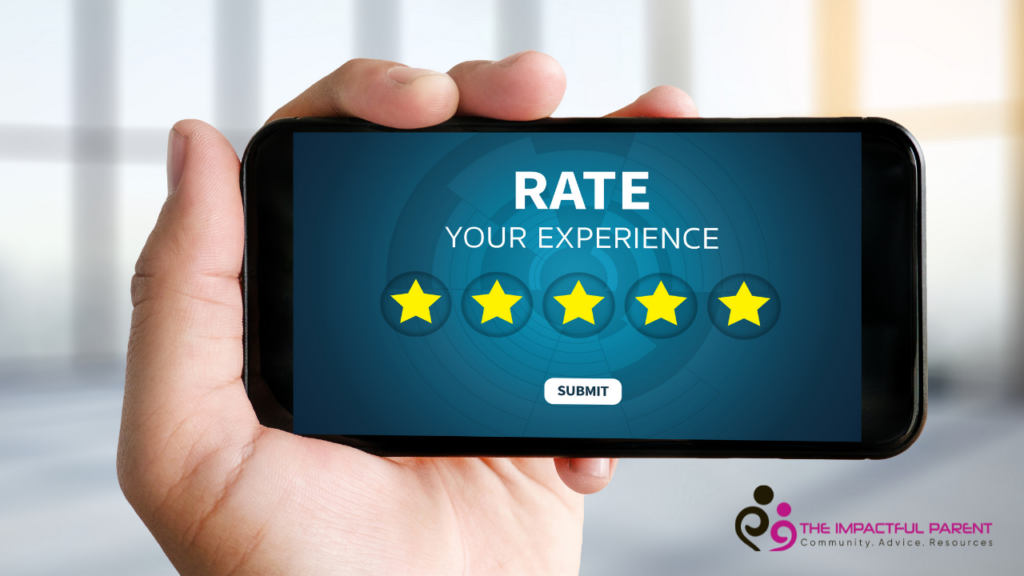
“I love Kristina and all the FREE tips that she has to offer! Thank you for making my parenting journey better!” <– If that sounds like you, please consider rating and reviewing my show! This helps me support more people — just like you!!!
Rate with five stars, and select “Write a Review.” Then be sure to let me know what you loved most about the episode!
Also, if you haven’t done so already, subscribe to the podcast. I’m adding a bunch of bonus episodes to the feed and, if you’re not subscribed, there’s a good chance you’ll miss out. Subscribe now!
What to do next:
1. Get The Impactful Parent App! Everything you need in your parenting journey in one spot! Available on the Android Play Store and the Apple Store. Search Impactful Parent (direct links listed above under Links in Episode).
2. Follow The Impactful Parent on social media if you don’t already! Facebook, Instagram, LinkedIn, & Pinterest
4. Check out the official website of The Impactful Parent for FREE RESOURCES, parenting classes, mom’s groups, and so much more! Click here to check it out!
5. Discover how you can work with Kristina! Sign up for a FREE 30-minute discovery call! Click here to find a time that works best for you!
Bottom Line… I am here for YOU! Contact me at theimpactfulparent@gmail.com

TRANSCRIPT
ADHD
Kristina: Welcome, impactful parent. Today, we will talk about four high-yield tips for parents to nurture kids with ADHD.
Hello, my name is Kristina Campos. I’m the founder of The Impactful Parent. I help parents of school-aged children turn their chaos into connection with their adolescence. I offer parent education videos every week, online courses, and coaching. And if that wasn’t enough, I bring experts in other fields to The Impactful Parent stage to teach you even more. Today I have a special guest. Her name is Dr. Marissa Bower. Dr. Bower is a behavioral pediatrician and CEO of Let’s Talk KidsHealth and creator of Teach Me ADHD. She is passionate about helping families become confident in navigating the road ahead after a diagnosis of ADHD.
Marissa: Thank you so much, Kristina, for having me.
Kristina: Well, let’s start with the basics. What is ADHD?
Marissa: So basically, it’s a very common neurobehavioral condition that affects how kids think and learn. And it just means that this population thinks and learns a little differently. It just means they need help with their attention and executive functioning.
Kristina: What should parents do if they suspect that their child has ADHD?
Marissa: I would talk to your pediatrician or primary care provider. Have a discussion about what you’re seeing, what you’re thinking, and then bring in any documentation from the teacher, any schoolwork, anything like that that is causing you some concern.
Kristina: What should parents be looking for? What are some signs of ADHD?
Marissa: There are 3 different types of ADHD.
- Hyperactive impulsive- This one typically is discovered early on, especially in younger kids. Kids are climbing all over. They’re disrupting class.
- Inattentive ADHD- This one usually comes to parents’ attention around third-fourth grade because, at that point, kids are not no longer just learning to read. They’re reading to learn. That’s a very different skill set. They have to draw on their working memory. We know that these kids, especially girls, can be missed until later on as the demands at school get more difficult.
Kristina: Let’s say a parent goes and gets a diagnosis. Their child has ADHD. Now what? What can parents do to support their children?
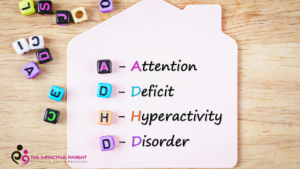
How To Work With A Child With ADHD
Marissa: We know that medication can decrease overall ADHD symptoms in children. This doesn’t mean that medication is the right fit for your family, but it will be an option. First of all, we have to understand the mechanics of what ADHD is and what it isn’t. It is a brain-based condition. ADHD affects the frontal lobes of a child’s brain. The part of the brain that is responsible for executive functions, such as organizing, prioritizing manager time, sustained attention, regulator, emotions, all of these different things. It is also important to talk to the child to understand their body. Some kids get scared when they are diagnosed. They have lots of questions too. We don’t want our kids to fear this. We want them to be proud of who they are because it’s a part of who they are. There are going to be things that will be challenges for them. Other things will be strengths.
So I think, first of all, having a conversation after the diagnosis is important. Also, revisit issues as your child gets older.
Kristina: Anytime you can start a conversation with your child and start asking questions, you’re displaying to your child that you care.
What’s your second tip?
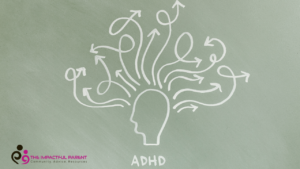
How To Work With A Child With ADHD
Marissa: We know that kids with ADHD often have a hard time regulating emotion. That’s one of the executive functions. So as much as possible, we need to expand their emotional vocabulary. Parents can teach kids how to express themselves and expand their emotions-words vocabulary. We experience as humans a whole range of emotions. That’s what makes us human. Also, provide verbal encouragement to your child and acknowledge their frustration and efforts.
Kristina: Good communication for kids is going to help them beyond ADHD.
What is tip number three?
Marissa: Individuals with ADHD often need multi-sensory ways of learning information. Parents and teachers need to provide different outlets for learning the same content. Yes, kids with ADHD can hyperfocus on a topic when they find it interesting; however, they will also have trouble focusing when the topic is considered boring or difficult. Parents may need to help their children get started. To do this, a parent can put a gentle hand on their shoulder, make sure there is good eye contact, get down on their level, use their name, and give attention cues. Kids often have a hard time pulling attention away from a preferred activity to a non-preferred activity or just transitions.
Kristina: Another great tip! What’s your tip number four?
Marissa: Treatment. This doesn’t necessarily mean medication, but it can. We can start doing right off the bat by teaching our kids self-care strategies, getting enough sleep, putting healthy foods in their bodies, proper exercise, and physical activity.
Another option is behavioral therapy. Get help from a health care professional to help your child learn and develop skills that will serve them as they grow. This is best done with a professional because kids need that outside help sometimes. Parents can’t do it all. Different therapists specialize in this and are trained to help your child.
Kristina: This is great information, and that’s not all! I hear you have a freebie for my audience.
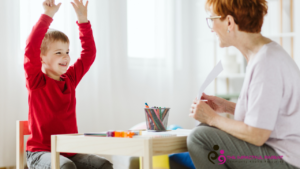
How To Work With A Child With ADHD
Marissa: I’m giving your audience my ebook! It’s about creating a care plan for your child. The book is written for parents after diagnosis. It talks about how to begin navigating the road of ADHD because you will hear things like IEP and 504. What is all this alphabet soup? It can be overwhelming. I hope that this freebie will help families understand the different pillars of the care plan so when you go to your child’s pediatrician, you can advocate for your child.
Kristina: If people want to come to you and get your advice, where can they find you?
Marissa: You can go to my website: www.letstalkkidshealth.org
I also have a weekly show where I bring guests to break down the stigma around behavioral health. I also offer my ADHD Course three times a year. The course is for kids with ADHD to take with their parents. Kids can see that they’re not alone, and the course is taken online. The course helps you bridge the gap and build up your toolbox of resources to be empowered and confident as you walk the road ahead.
Kristina: Thank you for being here, Marissa! The audience can pick up that eBook freebie by downloading the FREE Impactful Parent App at https://theimpactfulparent.com/app; I hope parents get these free resources today and start becoming more impactful parents.
It takes a lot to run a family! Here are a few products I recommend.
Gabb Wireless: The BEST first phone for your child!
- No internet, no social media, and NO WORRIES! This phone has GPS tracking and other features that parents want to have peace of mind about their child having a phone. The Gabb Wireless phone has the sleek look of a smartphone that kids love without worry and high price. To find out more and order your phone (or watch) go to: gabbwireless.com/promo/IMPACTFULPARENT30

